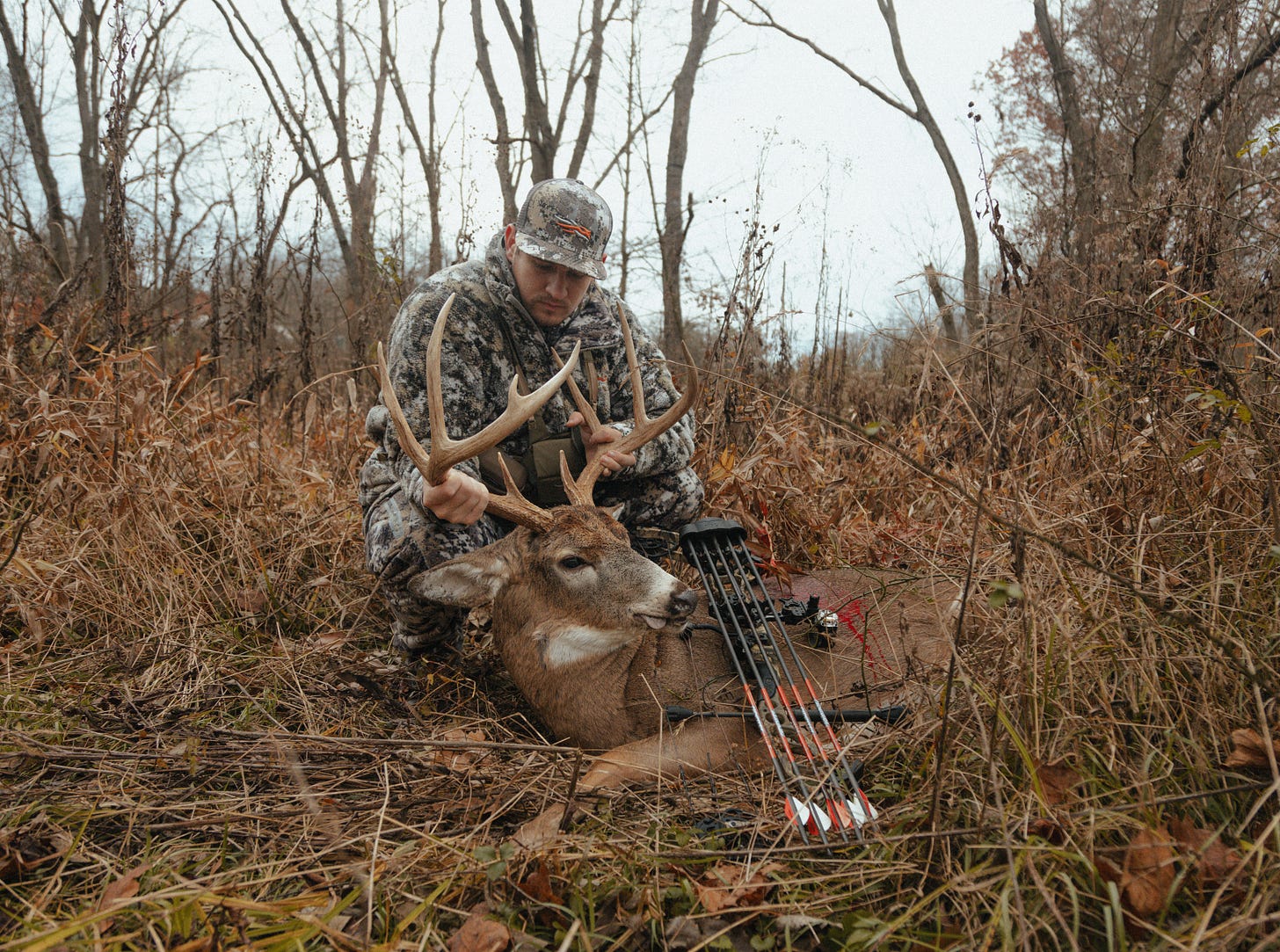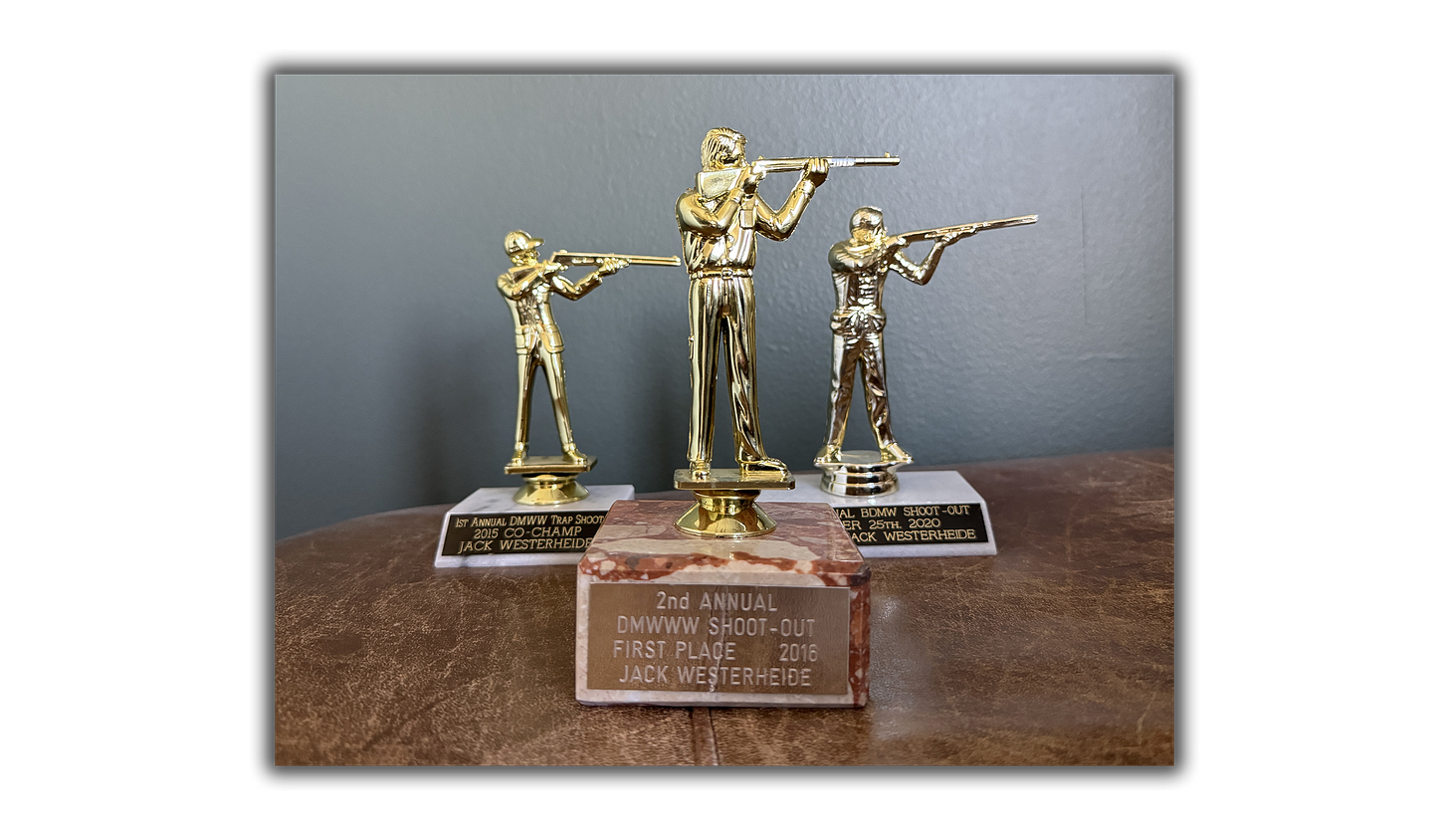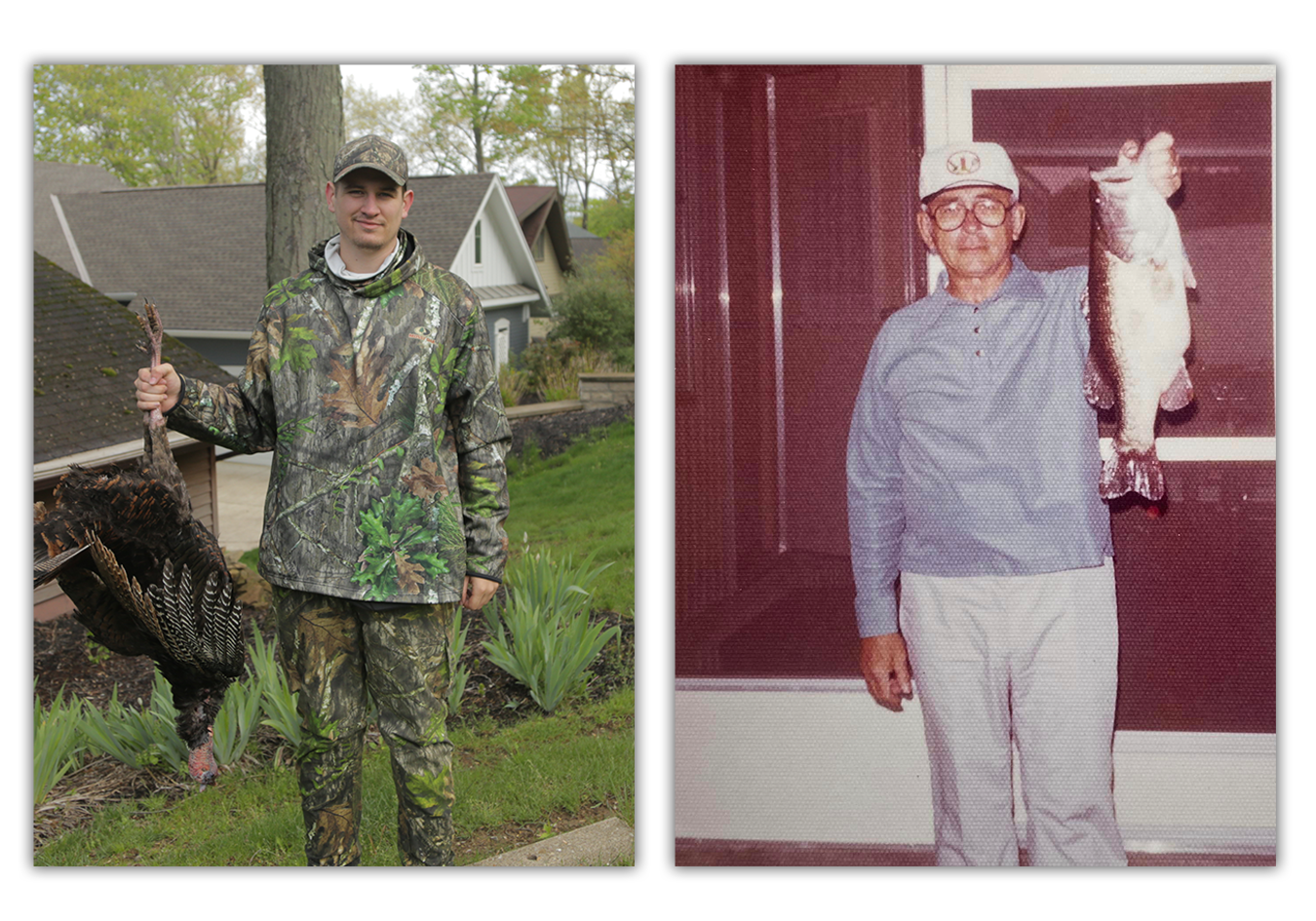Before We Begin:
This story took me over a month to write, edit, and feel comfortable enough to share. In many ways, it represents why I decided to combine The Field Review and The Outfitter Guide.
The outdoors have shaped who I am, but more importantly, they’ve helped me understand where I come from—and that understanding has been essential in figuring out where I’m going.
This story captures that connection between my past and my future, as well as between who I am in the field and who I am in my everyday life.
I sat in my tree stand for what must have been 40 minutes after taking the shot.
Probably longer than I needed to wait given that I had just watched my first Ohio Whitetail buck fall less than 20 yards from where my arrow hit him. But I wasn’t ready to move just yet. The adrenaline hadn’t left me entirely, but in the stillness of that cool November morning, I had time to reflect—not only on this moment, but on all the moments that led me here not just in my life, but in all of the lives that came before me.
For two seasons I had watched this individual deer grow through winter shed and summer velvet. I spent days in the stand waiting, and hoping. I had already felt the crushing blow of a missed shot, a singular moment I thought might haunt me forever, making me question if I truly had what it takes to be a successful hunter after so many hunts had ended empty-handed. But just a week later, everything clicked.
One perfect shot, one perfect moment.
In the 40 minutes that followed, I took a few for myself. On that seemingly random morning, I revived a tradition that had been waiting to be reclaimed, closing a gap in my family’s outdoor legacy that had been left ajar for far too long.
The ‘standard’ tradition of hunting is often passed down like a family heirloom. If you grew up in this culture you’re familiar with the unique set of skills that are inherited and nurtured from one generation to the next.
But in my family, the hunting tradition didn’t make it to me. It wasn’t intentional. It just slipped away, quietly, as life was pulled in different directions.
Hunting was once a significant cornerstone of my family’s identity. My great-grandfather was the kind of outdoorsman you (and sadly myself) will only hear about in stories. Raised in rural Ohio, he learned to hunt, fish, and trap from his grandfather. While the stories I’ve been told portray him as a true "fish-whisperer", his hunting and trapping skills were equally matched. Throughout the 1940s and 1950s you could find him hunting rabbits, squirrels and chasing coons with the dogs he raised for such occasions. By the 1960s he was driving solo from Ohio to Wyoming in search of antelope with nothing but a paper map and a rancher’s name scrawled on a scrap of paper. No GPS, no guides, just his instincts and his .243 Winchester.
“Pop” worked at the glass factory and owned a farm just outside of town where he raised cattle, hogs, sheep and chickens. In 1953 he bought a grocery store that doubled as a sporting goods store that sold hunting, fishing and athletic equipment while also serving as the local game check station. By 1960, it was all sporting goods.
Hunting and fishing weren’t just hobbies; they were a pillar of his life to the very end.
My grandfather, who was raised in that same world, leaned more towards athletics. A star in both football and basketball, he followed his own path, finding greater joy in sports than in hunting. The outdoors were a significant part of his youth, but by the time he reached adulthood, it had faded into the background. He would have two daughters (including my mother) which meant that for a generation, the rifles stayed locked away, the stories became more distant, and the act of hunting paused.
Even though hunting had faded from the forefront of my grandfather’s life, he never lost his love for the skills of the sport. He was the one who taught me how to shoot, passing down those lessons in small but meaningful ways. One Christmas, I was gifted a Red Ryder BB gun, which came in a package deal with a stern rule: “Don’t shoot robins or cardinals,” a lesson his own father had drilled into him, and one I still remember.
He taught me about gun safety, though that didn’t stop me from accidentally shooting my sister with that same Red Ryder (I didn’t quite understand how ricocheting BBs off the driveway worked at that age). There were plenty of moments spent knocking down cans and keeping squirrels off the bird feeders.
Eventually, he graduated me from that Red Ryder to my first real rifle—a .22LR bolt-action single shot we picked up at Swapper’s Day. It was (still is) a beautiful Remington with a fully custom wood stock, and to this day it has the cleanest action of any firearm I own.
We also put countless shells through his 12-gauge Browning Citori over-under shotgun. Every summer, my grandfather, my dad, and my sister would hold our own clay shooting tournaments at a local farm, and I’m proud to say I won most of those contests.
While my grandfather passed down the skills and knowledge of shooting sports, it was my own father who gave me a tangible connection to the outdoors. One rooted not in the hunt, but in adventure and common sense.
Growing up with seven brothers and sisters, my dad spent his childhood running around town, finding adventure and trouble wherever they could. They were always outside—trapping muskrats, raising rabbits (and, at one point, a raccoon named Rocky), and riding their bikes to fish at local ponds and lakes. It was a different kind of outdoor experience, one that didn’t involve camouflage or tree stands, but it fostered a deep connection to nature all the same.
My dad and all of my uncles are Eagle Scouts, an accomplishment he led me to achieve as well. Scouting meant spending many weekends and summers camping, hiking, and learning outdoor skills that were becoming increasingly rare as the world headed indoors. One of those trips took my dad and I to Havasu Falls at the bottom of the Grand Canyon before spending another week rafting down the Colorado River, sleeping on the banks under the open Arizona sky.
While scouting is not the same now as it was when I went through it, it provided me with opportunities to be outside that I didn’t fully appreciate at the time. Now that those moments are farther in between, I realize just how important they were.
My dad might not have been a hunter in the traditional sense, but he gave me the love of the outdoors that became the bedrock of my return to the path.
I grew up in a small Ohio town that still clings to its rural roots, though it’s slowly becoming more suburban with each passing year. I knew a few kids whose dads hunted, but it always felt like an activity from a different era, distant and not something I considered for myself.
Despite living in some of the best deer hunting territory in the state, hunting wasn’t part of the world I was mentally surrounded by.
It wasn’t until 2020, in the middle of a global pandemic, that something in me shifted. Life had slowed down, and I found myself searching for more than just another distraction. That’s when I stumbled across a Netflix documentary called Stars in the Sky: A Hunting Story, a prequel to Steven Rinella’s MeatEater TV series. To that point in my life, the only depiction of hunting culture I had ever known focused around trophies, the success of the hunt and the photos that followed.
But this documentary, and Rinella’s philosophy itself, wasn’t just about the hunt itself—it was about the deeper connection between humans and nature, about the ethics of taking a life, and the responsibility that comes with it.
One quote still sticks in my mind:
“Hunting is the most honest, the most justifiable and honorable way to feed you and your family.”
STEVEN RINELLA
This struck a chord for me on a personal level, especially during a time when the world was going through the greatest health crisis in a century. In those moments, you start to rethink the things you normally take for granted—things like where your food comes from, what’s in it, and what impact it has on your body and the world around you.
I wasn’t a chef or a farmer, but the pandemic had me questioning how disconnected we’ve become from the basics of food and survival.
At that point, I wasn’t thinking about my great-grandfather or the family hunting tradition. I remembered some of those old stories, but there were also many that I hadn’t even heard yet. I just knew that this was something I wanted to learn more about.
It wasn’t an easy journey.
Despite what some raised in the culture might tell you, it’s not an easy community to break into. Access, protocols, personal opinions, protectiveness, regulations, and more prevent someone who has never hunted from entering the woods.
Learning to hunt took a lot of time, even more patience, and years of trial and error. I asked questions, I did my research, I shadowed experienced hunters, and spent long hours in the woods. I always came back empty-handed.
But with each hunt, I learned something new—not just about hunting, but about myself and my relationship to the outdoors.
I went from driving by fields never once noticing deer or turkeys, to counting bachelor groups and watching for distant struts while simultaneously trying to avoid driving over the centerline.
My first successful hunt started where all first time hunters should, with wild turkeys. From there, the progression felt natural—blue-winged teal, Canada geese, dove, pheasant, and mallards.
Taking my first deer—a buck with a bow down in Kentucky—felt like a major milestone, but the journey didn’t stop there. I followed it up by harvesting my first Ohio doe that same season. Every step was a lesson, every hunt helping me to take another step forward.
Last season, when I finally took my first Ohio Whitetail buck, it all clicked. This was more than just another successful hunt—it was a realization that I had found something deeper, something that connected me not only to the land but to the traditions and people that came before me.
I never had the chance to know my great-grandfather. He passed away five months after I was born, so the stories I’ve heard about him are all I have to go on. I can’t tell you what his personal perspective was on hunting or fishing.
I’d like to believe he’d be proud of the way I go about it.
One thing I do know for certain– the work I put in to close this gap, to bring our family tradition back to life, will not be wasted.
This journey I’m on will not die with me.
I may not have children of my own yet, but when I do, they’ll know exactly where their outdoor roots come from.
Whether or not they choose to carry on this tradition, they will recognize its importance and understand that it holds more value than the world gives it credit for.
This story is about more than just hunting—it’s about understanding where we come from, and making sure that this connection is never lost.
Until Next Time:
I’d love to hear about your family’s outdoor tradition, and it doesn’t have to revolve around hunting. I believe that as a society, we’re getting farther and farther away from our outdoor roots with every generation, and that it’s up to the few of us that care about tradition, about community and about nature to carry on what the world wants us to forget.
If you have a story you think deserves to be told, let’s connect.
Always Forward,
Jack








I appreciate this post. My now-late stepfather was a hunter in the traditional sense, and he fostered a love of the outdoors onto me (although my hunting is done with a camera).